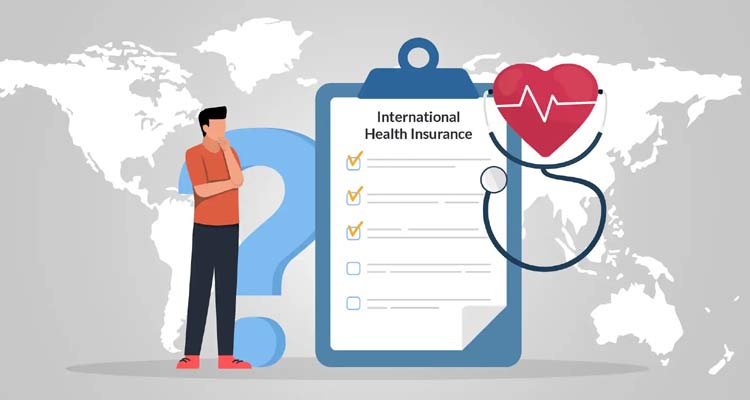Insurance
International Health Insurance For Expats – Best Options, FAQs

International health insurance, as the name suggests, is intended to cover your medical needs while you are in a foreign country. So, this type of insurance is similar to traditional health insurance, except that it covers medical expenses while you are living abroad. This is why it is critical to understand how international health insurance works.
What Does International Health Insurance Cover?
Most international health insurance plans offer coverage for the following, but you can choose what you wish to cover and to what extent:
- In-patient medical treatment: hospitalization, surgery, intensive care unit, anaesthesia, lab tests and X-rays.*
- Out-patient medical treatment: physician visit, specialist visit, psychiatrist visit, urgent care, emergency room, etc.*
- Emergency services*
- Prescription medication*
- Dental coverage.
- Vision coverage.
- Maternity.
- Mental health care.
- Physiotherapy.
- Rehabilitation.
- Pre-existing health conditions.
- Evacuation or repatriation.
- Travel health insurance.
*These items are usually included on the “basic coverage” plans. This means most insurance companies will cover them, whereas the rest of the items may or may not be included on an insurance policy, but you may be able to purchase them as add-ons.
Is International Health Insurance Mandatory?
International health insurance is not mandatory, but most expats prefer global insurance because it offers peace of mind. So, if you have international health insurance, you won’t have to worry about medical issues while in a foreign country.
International Health Insurance vs Travel Health Insurance
You’ve most likely purchased travel health insurance before your trip abroad. You are aware that it covers medical emergencies abroad, just as international health insurance does. However, if you intend to live abroad for an extended period of time, travel insurance is not a viable option.
For starters, travel insurance is only valid for a limited time and only covers medical emergencies. Pre-existing conditions, maternity, dental, and other coverage are rarely included in travel insurance policies. Travel insurance is intended to protect you against unexpected losses during a vacation or business trip, not to provide ongoing health coverage. However, if you are already an expat and want to travel abroad briefly before returning to your home country, you should look into expat travel insurance options.
Pros of Having International Health Insurance
One of the most significant benefits of having international health insurance is that it covers you worldwide, regardless of where you are. Furthermore, international health insurance gives you access to English-speaking doctors in countries where English is not spoken, private healthcare, including private health facilities, and immediate care with no wait times. Also, with international health insurance, you reduce the cost of any medical expenses that you would otherwise have to pay out of pocket.
How Much Does International Health Insurance Cost?
International health insurance can cost you anywhere from $200 to $900 per month— with an average of $500. However, your international health insurance can vary depending on the following factors:
- International or local. International plans cost more simply because they have a wider range of coverage – both in terms of geographical scope as well as covered items – than local plans.
- Your age. Most companies have different prices for different age ranges. The prices increase along with the client’s age, and many companies stop offering coverage after a certain point (usually 75-85 years).
- The amount of coverage. If you purchase a plan with a $500,000 maximum, it will cost less than a plan with a $2,000,000 maximum. This is the amount you will be covered for on a yearly basis or per claim, depending on the policy.
- Covered items. If you subscribe to a basic plan, with just medical treatment, hospitalization, emergency services, etc. it will be less expensive than adding coverage for the “optional” items, such as maternity, dental, or mental health.
- The people included in the plan. Naturally, you would pay less for an individual medical insurance plan than for a plan which also covers your family members.
Remember: Do not choose the cheapest plan available. These types of plans are usually extremely limited, and will not give you the coverage you need. If it sounds too good to be true, it probably is, especially when it comes to health insurance.
How to Purchase International Health Insurance?
Here is a brief summary of how you can purchase international health insurance:
- Find an international insurance provider. You can look for such a provider in your home country or refer to online companies that offer insurance policies specifically for global coverage.
- Check the insurance policies. Most providers will provide a basic insurance policy and a more comprehensive policy. The basic plan usually covers only emergency cases, while the comprehensive policy covers anything, from emergencies to dental and eyewear expenses.
- Buy your insurance plan. There are a few different ways how you can buy international insurance— the most common being:
- Directly— you can buy the insurance plan directly via the insurance company.
- Via an insurance agent— licensed insurance agent may be working for a specific company or several insurance companies and offer you the plans their clients have available.
- Via an insurance broker— the insurance broker will cater to your needs as a client and provide you with several options for your international health insurance policy.
- Retrieve your ID card. After you buy your international health insurance, your provider will equip you with an ID card containing your information and insurance details. You will need to present this card while visiting a healthcare center in a foreign country.
How to Choose the Best International Health Insurance Plan?
The best health insurance plan is different for everyone, depending on specific needs. So, when choosing an expat health insurance plan, pay attention to the following:
- Is the coverage fixed or comprehensive? Fixed coverage plans are less expensive, but only pay a fixed amount per claim (which in some cases can be too low). Comprehensive coverage plans are more expensive, but the insurance company pays based on a percentage, which can be up to 100%.
- Does the insurance plan cover everything you need? Does it cover you at least for all basic medical emergencies and treatment?
- Will it cover you if you are abroad? If you intend to travel back to the US or to another country, do you have health insurance there? Does the plan have evacuation or repatriation coverage?
- What are the “optional” coverage options? Does it have dental coverage, or do you need to get that elsewhere? What about maternity?
- How much is the policy maximum? Is it on a yearly basis, lifetime, per claim, or unlimited?
- Is it renewable?
- How much is the deductible? How much do you have to pay yourself before the insurance company steps in and covers the rest?
- Does the plan cover pre-existing conditions? If yes, to what extent?
- Does the expat insurance company have a direct-claim procedure? Some insurance companies have agreements with certain hospitals, where the hospital can send the bill directly to the insurers, and you do not need to pay anything yourself. These are usually called “in-network” hospitals.
When Should You Get Health Insurance?
Some insurance plans require a waiting period during which they may not provide the full range of coverage. So, the sooner you buy, the more you can be confident that you will be well taken care of in the event of an emergency.
Naturally, if you intend to subscribe to a local insurance plan, you must wait until you have settled in.
In contrast, the rules for national (public) insurance plans vary by country. However, you can purchase international health insurance at any time.
How to Make a Claim With International Health Insurance?
All health insurance companies have an emergency hotline that you can use to request assistance. They also have their own set of procedures for processing claims, which you will learn about before purchasing the policy.
Some international insurance companies have a network of hospitals where you can receive treatment, and the hospital sends the bill directly to the company, so you do not have to pay anything.
In other cases, you must pay the bill and then submit a claim to be reimbursed.












